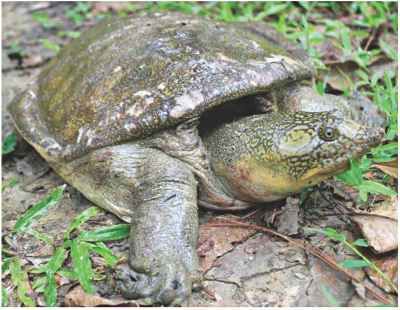<i>'Bostami turtle' found in wild </i>

A soft-shell "Bostami turtle" found in the wild. Photo: CARINAM
The soft-shell N. nigricans turtles, popularly known as “Bostami turtles”, have been found in the wilds too.
These turtles were traditionally believed to be nearly extinct and only available at a pond of the shrine of Hazrat Bayezid Bostami in Chittagong, where there are around 150 turtles.
A group of wildlife biologists of the Centre for Advanced Research in Natural Resources & Management (CARINAM) recently found these turtles at some other places in the country.
Dr SMA Rashid, chief executive of CARINAM, in a statement yesterday said the group had conducted a survey on the freshwater turtles' trade in 2009 and found several specimens of Bostami turtles in Chittagong and Sylhet.
“The turtles at the Bayezid Bostami shrine pond were not brought from Iran but had been collected locally and kept in the shrine pond almost a hundred years ago,” he said.
It was a common belief that the Bostami turtles were brought from Iran, the country from where the Islamic saint and preacher Bayezid Bostami hailed, said Dr Rashid, a leading wildlife biologist of Bangladesh.
Wildlife expert Malcolm Smith in his monumental book ,“The Fauna of British India” (1931), noted that the Bostami turtles in a Chittagong shrine pond were believed to have been brought by Hazrat Bayezid Bostami from Iran in the 1800s.
He stayed in Chittagong and attained the status of a saint while these turtles were also treated as 'sacred', the book says.
The CARINAM statement said these Bostami turtles look a bit different from the other soft-shell ones. Furthermore, the coloration of N. nigricans is more variable than thought before.
Dr Rashid said tissue samples from these turtles were collected and analysed for species identification. “Our data provides clear evidence that wild N. nigricans occur in Bangladesh.”
Their genetically-identified samples are the first record for Bangladesh, and it was recently published in a peer-reviewed scientific journal, “Vertebrate Zoology”, published in Germany, said Dr Rashid, who is the co-author of the scientific paper.
“This recent finding is very important as it solves the mystery of the origin of the turtles,” he observed.
This discovery, however, does not undermine the importance of conserving the turtles in the shrine pond, but signifies that wild populations should be protected in their natural habitats, Dr Rashid noted in the statement.
In 2007, another famous wildlife biologist, Peter Praschag, published his doctoral research work where he mentioned that Bostami turtles were also found in some of the temple ponds in Assam, India.

 For all latest news, follow The Daily Star's Google News channel.
For all latest news, follow The Daily Star's Google News channel. 



Comments